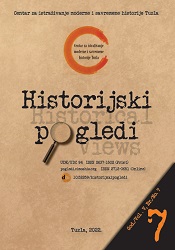Uzurpacija imovine vakufa džamije Azizije u Brezovom polju i džamije u Omerbegovači u srezu Brčko, nakon Drugog svjetskog rata
Usurpation of the Property of the Waqf of the Azizija Mosque in Brezova Polje and the Mosque in Omerbegovača in the District of Brčko, after the Second World War
Author(s): Izet ŠabotićSubject(s): Political history, Islam studies, Government/Political systems, Politics and religion, WW II and following years (1940 - 1949), History of Communism
Published by: Centar za istraživanje moderne i savremene historije Tuzla
Keywords: Waqf of Azizija mosque in Brezova Polje; waqf of the mosque in Omerbegovača in the Brčko district; expropriation of land; change of ownership;
Summary/Abstract: Immediately after the Second World War, the new communist government implemented harsh-radical measures aimed at changing ownership relations. Thus, the property of „ enemies of the state ", emigrated Germans, private companies and banks, and the property of religious communities were hit. The property of the Catholic Church and the Islamic Community was particularly affected. In order to usurp the property of these institutions, the new communist government passed a set of regulations, such as those related to confiscation of property, nationalization, expropriation, and numerous other processes, such as agrarian reform and colonization. The adopted regulations gave the state the legitimacy to change the ownership of the property. These were complex processes, which left numerous consequences in the field of economic, social, legal and other areas, both for certain institutions and individua/s. In this way, the new communist government wanted at all costs to disable the institutions it considered hostile, such as religious communities, and to settle those who contributed to the People 's Liberation Movement and who supported their ideology. The aspirations of the communist authorities went in the direction of changing social and property relations and creating a new society, based on a new ideology. The Islamic Community in Bosnia and Herzegovina had significant waqf property, which contained numerous residential, business and office buildings, as well as significant land holdings. In the wider area of Brčko, the Islamic Community owned significant waqf property. Although it was a property that was protected from the aspect of religious (Sharia) law, in terms of any change of ownership, it came under the impact of the measures of the communist government. In the area of Brčko, the usurpation of the property of the Islamic Community began immediately after the establishment of the communist government and lasted until the J 990s and the establishment of the multi-party system . In the wider area of Brčko, property was confiscated from the Islamic Community through nationalization, confiscation, expropriation, arondation, and other measures adopted by the communist authorities. The same was done with the property of the waqf of Azizija mosque in Brezova Polje and the waqf of the mosque in Omerbegovača in the Brčko district. This was a strong blow to the Islamic Community, which subsequently weakened economically, and within the Islamic Community ceased to exist many institutions and facilities that have been the bearers of the overall activities of these institutions far decades. Among other things, madrasas were abolished, a significant number of mektebs were closed, the charity „Merhamet " ceased to operate, and many other important functions of the Islamic Community were completely or partially endangered. The goal was to weaken the property economically and confiscate the influence of the Islamic Community on society, in order to carry out its atheism, which was one of the important tasks of the new communist government. We will see the consequences of such actions on the example of the usurpation of the property of the waqf of Azizija mosque in Brezova Polje and the waqf of the mosque in Omerbegovača in the Brčko district, immediately after the Second World War.
Journal: HISTORIJSKI POGLEDI
- Issue Year: V/2022
- Issue No: 7
- Page Range: 254-269
- Page Count: 16
- Language: Bosnian

